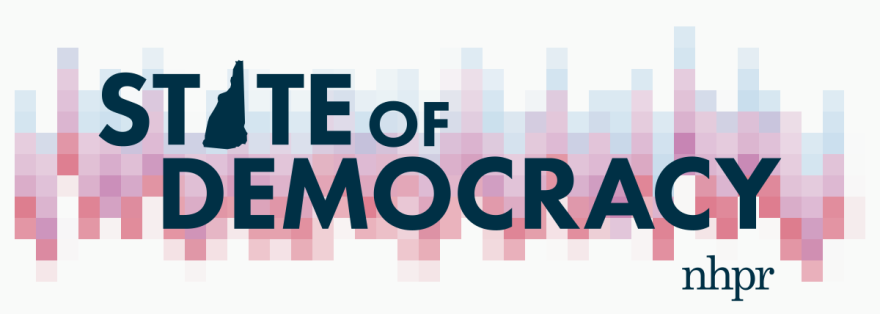New Hampshire is still considered a swing state, despite a trend toward Democrats in the last few presidential elections. But when you look further down the ballot, there are relatively few districts that can still be called battlegrounds—most are reliably red or blue. One of the last ones left is a long slice of the Seacoast—State Senate District 24. NHPR’s Natasha Haverty reports on how two candidates are working to tip the scales there.
I sat on the stairwell in the Hampton Town office building with Democrat Tom Sherman last Thursday evening.
He and his opponent Republican Dan Innis had just done their first forum—for all the people at home watching their local public access channel—and Sherman seemed a little disheartened. He felt like there’d been no time to get into the nitty gritty.
"The problem is that you are very limited in getting your message across. You can’t really rebut what the person has said. It’s hard, really hard to convey complexity."

And conveying complexity—that’s what it might take to win voters in District 24. Because this one really could go either way—in the last few election cycles, District 24 went Democrat for Governor, Republican for US Senate, and back and forth for Congress. It’s one of the only state Senate districts left where that kind of ballot splitting is actually the norm.
Both candidates say that’s why they’re best suited to represent it—they’re not confined by their parties. Here’s Republican Dan Innis.
"Party line always sort of bothers me. I think we all have to make our decision for constituents not for party. I will make the best decisions for the state and for its people. And that’s what matters to me."
But this is also the first election since the new District 24 was drawn that the seat is open. The person who’s held it for the past three terms—Republican Nancy Stiles—is stepping down. She was a moderate, and her successor will need to be too.
Innis and Sherman do share some view points. Both support a woman’s right to choose. Both have big problems with right to work legislation.
But maybe the best measure of what kind of senator either of them will be, is how they think through a policy question. So let’s just take one case study—the death penalty. And that’s a good one to look at, because the last two efforts to repeal New Hampshire’s capitol punishment law it failed by a single vote in the Senate.
So how do these two candidates think through big, hairy, policy questions? How do they navigate moral issues like the death penalty?
"That’s something that that we’re going to have a long heart wrenching and soul searching discussion about," Tom Sherman says. He views most policy question through the eyes of a doctor—that’s his day job. But he's the first to admit: he struggles with being morally consistent on this one.
"I mean on almost every level I have to oppose the death penalty? I think the most difficult issue comes in just to be blunt, we have one person sitting on death row in the state."
Sherman’s talking about Michael Addison, who was convicted of killing a police officer ten years ago.
"The cost to fully litigate all of the appeals processes and then we have to build a way to kill him! We as a state have to allocate funds to execute one person. I think at the very least we should say no more except this one, and I…could live with that. Because I don’t think the world is a perfect place, and I think we have to…do the best we can."
Dan Innis has also thought through this question. Usually he frames policy questions from the financial side—he’s a successful businessman, he was dean of the UNH business school—but not this one.
"You know I’ve had a lot of conversations with people, and my position on the death penalty is that I support it. I think it should be used rarely, and in exceptional cases. If it’s either or? I’ll vote to keep the death penalty."
I ask him if he's sure, even considering the dollar figures for how much it would cost for the state to execute someone.
"Yes," Innis says. "Some things are a matter of principal, not just dollars and cents. And some crimes are so heinous—and we’ve seen them."
But in a noisy election season like this one, these guys don’t get a lot of room for nuance like this. Back on that stairwell the other night, Tom Sherman had one solution:
"You know, if all things were equal, I’d like to share the seat with Dan. And I could see that! Dan has strengths, and I have strengths. And…so what does that mean for what’s best for this state? Well that’s what the voters have to decide."
But, sadly, voters can only pick one of these guys to sit in the seat.






